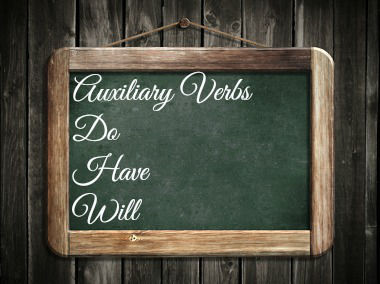Verbos auxiliares em Inglês
Do you know how to use the auxiliary verbs? When you have to use them? Why do we have to use them? Let's take a look at the structures of the axillary verbs to comprehend more about them! / Você sabe como usar os verbos auxiliares? Quando temos que usá-los? Por que temos que usá-los? Vamos dar uma olhada em sua estrutura e compreender mais sobre eles.
The auxiliary verbs are: BE, DO, HAVE, and WILL. They don't appear alone in the sentence, they are followed by another verb (the main verb) and they are used to form a question, a negative sentence or the passive. They are helping verbs, they help another verb in the sentence and sometimes they don't have meaning used separated. / Os verbos auxiliares são: BE (ser;estar), DO (significa “fazer” quando usado como verbo principal, porém como auxiliar não tem um significado específico), HAVE (ter) e WILL (indica tempo futuro). Eles não aparecem sozinhos nas frases, são seguidos de um outro verbo (o verbo principal) e são usados para formar perguntas, em frases negativas ou na voz passiva. Eles são verbos ajudadores, ajudam outro verbo na frase e algumas vezes não possuem significados se usados separados.
To give a meaning for the sentence the verbs (main and auxiliary) have to be together, they don't need necessarily appear side by side, but they work together. / Para dar sentido na frase, os verbos (principal e auxiliar) devem estar juntos, eles não precisam necessariamente aparecerem lado a lado, mas precisam trabalhar juntos.
When we have an auxiliary verb and a main verb together, we have a verb phrase. Like in the example: / Quando usamos os verbos auxiliares e o verbo principal juntos, temos uma frase verbal. Como no exemplo:
They could go to the Theatre tonight. / Eles podem ir para o cinema esta noite.
(Auxiliary verb + Main verb = Verb Phrase) / (Verbo auxiliar+verbo principal= frase verbal)
Another examples: / Outros exemplos:
He didn't take her at the airport. / Ele não a buscou no aeroporto.
Have you been here all day? / Você esteve aqui o dia todo?
Using the auxiliary verbs to: / Usando os verbos auxiliares para:
Make a question / fazer uma pergunta
-
Do you want be here with me? / Você quer ficar aqui comigo?
-
Will we meet tomorrow? / Nós iremos nos ver amanhã?
-
Will they come with us? / Eles virão conosco?
-
Do you go to the park today? / Você irá para o park hoje?
-
Do you worked late last week? / Você trabalhou até tarde semana passada?
-
Have you got a cat? / Você tem um gato?
-
Has your sister got a bicycle? / Sua irmã tem uma bicicleta?
Negative sentences / frases negativas
-
Jane doesn't want my company. / Jane não quer minha companhia.
-
I don't know a word about it. / Eu não sei nada sobre isso.
-
My mother doesn't agree with me. / Minha mãe não concorda comigo.
-
They didn't loose the game yet. / Eles não perderam o jogo ainda.
-
I haven't got a car. / Eu não tenho um carro.
Passive voice / voz passiva
-
She was seen by her sister at the subway station. / Ela foi vista pela irmã na estação de trem.
-
This film has been watched by many people. / O filme foi assistido por muitas pessoas.
-
He was given a free party. / Ele estava dando uma festa gratuita.
-
They will be woken at 5. / Eles estarão acordados às 5.
-
It will have been finished by you. / Isto será finalizado por você.
-
They will be there. / Eles estarão lá.
That's it! In English the auxiliary verbs are very common and you have use them for almost everything that you want to say. Remember that the auxiliary verb show us the tense of the verb, we can know if the fact is in the past, present ou future just with the auxiliary: Do – present/ Did – Past/ Will – Future. / É isso! Em inglês os verbos auxiliares são muito usados e você precisa deles para quase tudo que for falar. Lembre-se que os verbos auxiliares nos mostra os tempos verbais, podemos saber se o fato está no passado, presente ou futuro apenas pelo auxiliar: Do – presente / Did – Passado / Will – Futuro.
Practice yourself! / Pratique!

